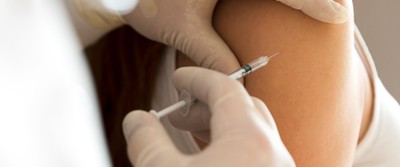Best Way to Stop Pain: Ignore It

By Gina Wynn
No one likes getting a flu shot. Some of us feel terror at just the thought of being stuck by a needle. But others stay calm and cool and deal with vaccinations as a minor nuisance.
How can we explain these reactions? Scientists at the University of Amsterdam in the Netherlands tested their ideas in a recent study. They found that if you think something is going to hurt a lot, it probably will. And the opposite is also true. If you expect a shot to feel like a tiny prick, that’s what you’ll probably experience.
Marieke Jepma is the neuroscientist who led the study that was recently published in the journal Nature Human Behaviour. As someone who studies the brain, she wanted to see how much the expectation of pain influences our discomfort. After observing how 62 volunteers reacted when she placed hot patches on their arms or legs, Jepma and her team found that people learn their reactions to pain.
The Study
Before applying the patches, volunteers were shown shapes on a computer screen that warned them the pain was going to be bad. Another group of volunteers were shown images suggesting the pain would be minimal. The scientists asked both groups to use a scale of one to 100 to rank how much pain they expected to experience.
The patches were heated to the same temperature for both groups of volunteers (about 49°C or 120°F), which was expected to produce the same amount of pain for all. Instead, the volunteers who were shown shapes suggesting the patches would hurt a lot reported more pain than the others when they ranked their actual pain level on the same scale.
Additional Evidence
To collect more data for the study, the scientists ran the test on the volunteers while they were lying in a magnetic resonance imaging (MRI) machine. MRI machines can scan people’s brains and show the amount of electrical activity taking place.
Brain activity reflected how the volunteers ranked their anticipated and actual pain levels, regardless of whether their expectations were low or high.
Temperature Check
Jepma and her team decided to take the experiment a step further. They repeated the steps of the first study but varied the temperature of the patches. For some volunteers, they raised the temperature of the patches, so the pain was worse than the first time they were tested. For others, the temperature was lowered, so the pain was more tolerable.
The scientists then examined how the volunteers learned from their experiences. They found that if the warning was consistently related to the pain, the subject would “learn” how to react. But if the warning and pain level did not “match,” then no learning took place.
Learning from Experience
Jepma and her team concluded, “When [something] confirms our belief, we learn from that experience.” But when reality doesn’t match what we expect, we don’t learn.
She attributes her findings to something called confirmation bias. According to Psychology Today, confirmation bias occurs when your desires influence your beliefs. When people really want something to be true, they usually start to believe that it is true. This bias doesn’t just occur in relation to pain, it happens in many different types of situations.
Realistic Expectations
Other scientists have also studied how expectations affect one’s level of pain, including Katja Wiech from the University of Oxford in England. Wiech commented on the uniqueness of the University of Amsterdam study, “It shows not only that the perception of pain is biased, but the [brain’s] response to that [pain] is biased.”
Jepma pointed out that pain isn’t “all in your head,” however. It is a real physical sensation that is important because it warns people of danger. But she hopes her study will prevent people from having an exaggerated response to pain.
Jepma’s findings may also help doctors learn to treat pain more effectively. And, by teaching patients to have more realistic expectations, they might see better results from medication and other therapies.
Discussion Questions
- After reading this article, how might you behave differently the next time you go to the doctor’s office and need a shot?
- What does confirmation bias mean to you? Give an example of how confirmation bias could affect someone’s decision.
Vocabulary
- Neuroscientist
- Rank
- Magnetic Resonance Imaging (MRI)
- Confirmation bias

